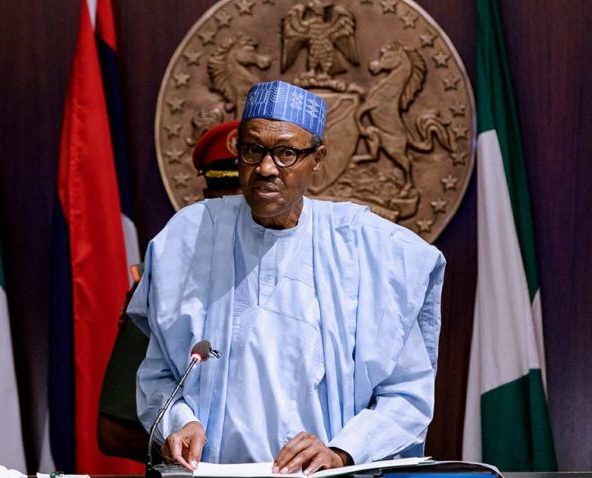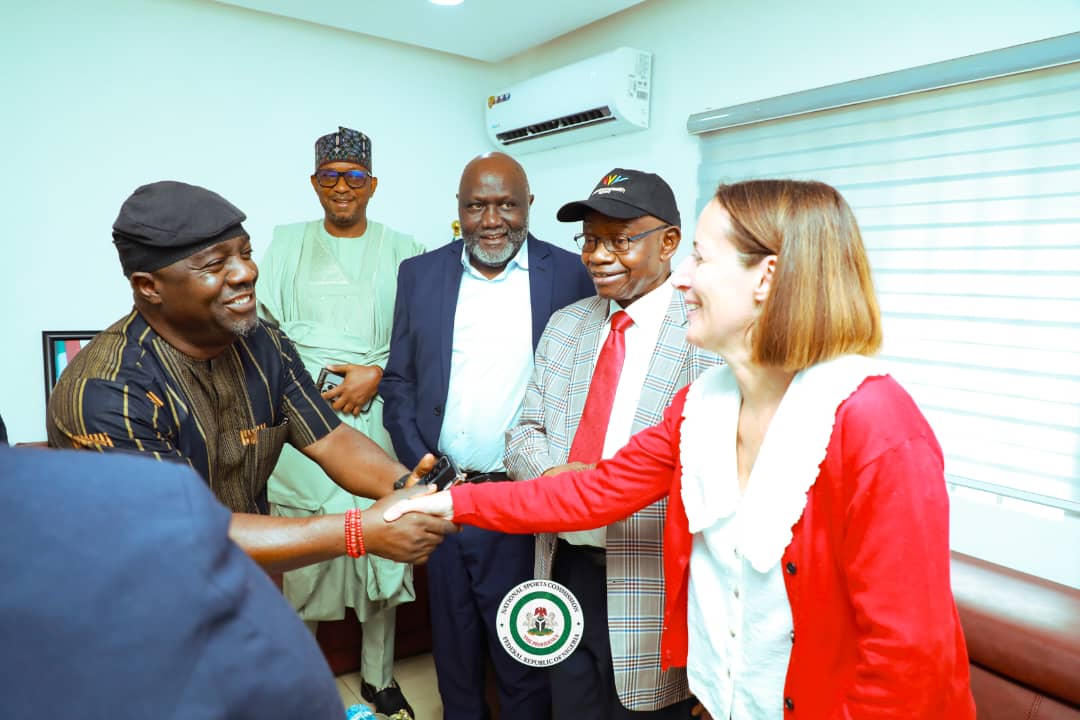Featured
President Buhari Inaugurates Presidential Steering Committee On Alternate School Programme

Joel Ajayi
President Muhammadu Buhari has inaugurated an 18-member Presidential Steering Committee on Alternate School Programme ASP.
At the inauguration which took place at the Presidential Villa on Tuesday in Aso Villa, President Buhari charged the ministry of Humanitarian Affairs, Disaster Management and Social Development to coordinate and lead the deployment of a National Plan which will address the issue of out-of-school children in the country.
In a press statement issued by the Senior Assistant to the Minister of Humanitarian Affairs, Disaster Management & Social Development, Nneka Ikem Anibeze on Tuesday expressed that it was unacceptable to see children abandoning formal school to engage in menial jobs and child labour in the markets, streets and workshops.
“While we continue to sustain our efforts on providing formal and conventional education through the activities of the Universal Basic Education Commission under the Federal Ministry of Education, it is still a common sight to notice children abandoning formal school to become apprentices in shops, workshops and markets, whilst many others choose to loiter at markets, become cart pushers and hawkers. These are not acceptable.
President Buhari implored all members of the committee to take the assignment with utmost seriousness adding that “the future of our young people is at stake”.
Earlier, the Chairman of the Committee Umar Farouq thanked the President for his support to the Ministry and for granting the approval for the Alternate School Programme.
The minister noted that the number of Out-of -School children was increasing at an alarming rate, adding that there is urgent need to address the problem with deft response required of such an exigent matter.
“Education serves as a catalyst for the all-round growth and development of any individual. Thus, for any nation to thrive, adequate investment in human capital, by increasing access to quality education, must be prioritized. The United Nations identifies quality education as one of the most powerful and proven vehicles for attaining sustainable development”.
The Minister lamented the challenges facing the country due to the growing number of out of school children which cuts across the entire nation.
“Those mostly affected by this scourge include the girl-child, predominantly in the North, Almajiri-children in the North, children of nomadic pastoralists spread across the country, incidence of boy child drop-out mainly in the South-East and South-South regions, street children in the South-West, commonly referred to as area boys, particularly around the Lagos axis, children of migrant fishermen in the South-South, and more recently the internally displaced children in the North-East, occasioned by the Boko Haram insurgency and insecurity”.
Umar Farouq assured the President that the Committee will leverage on the Ministry’s social protection instruments including N-Power, the Conditional Cash Transfer and the Home-Grown School Feeding Programmes to provide tailored delivery mechanisms targeted at the country’s out of school children.
“By integrating basic education with religious education and vocational training, the Alternate School Programme will increase access to education without altering social norms and cultures. Consequently, every child, including those in the most peculiar of circumstances, will have access to learning opportunities”.
According to UNICEF, Nigeria currently has the highest number of out of school children globally, while it is estimated that approximately 10.5 million children aged 5 to 14 years are not in school. Statistics also show that only 61 per cent of children within the 6 to 11-year age bracket regularly attend primary school while the North has an abysmal net attendance rate of 35.6 per cent.
The Alternate School Programme, is an innovative and flexible approach to learning and skills development, ensuring that education is designed to specifically address the needs of the target beneficiaries and is delivered conveniently, without unnecessary encumbrances. By targeting out of school children, the program will ensure that more children are equipped with basic literacy skills, reasoning capabilities and technical and vocational expertise that will enable them to live fulfilled lives.
It is also expected to significantly reduce the number of out of school children in Nigeria, provide access to inclusive and equitable quality education, eliminate child labour, facilitate the effective integration of religious discipline and vocational training with basic education, provide opportunities for children to develop life supporting skills from vocational and entrepreneurship training to improve their chances of future success, improve the quality and outcome of basic education in the country and foster tolerance, unity, and integration of all children with diverse backgrounds into the larger society.
The Presidential Steering Committee has been mandated to Refine the vision of the initiative.
Ensure engagement and effective uptake of the ASP initiative across the country, Review and approve all work, implementation plan, expected deliverables, feedbacks and reports as proposed and
Undertake any other task that can enhance the effective delivery of the initiative by the Ministry.
Members include: Minister, Federal Ministry of Humanitarian Affairs, Disaster Management and Social Development who will Chairman the committee.
Others members are; Minister of Education Co-Chairman; Minister of State of Education Member; Senior Special Assistant to the President on the Sustainable Development Goals – Member; Minister of State, Budget and National Planning – Member; Chairman, Northern Governors’ Forum – Member; Executive Secretary, Universal Basic Education Commission (UBEC)-Member.
Also, the Director-General, National Youth Service Corps (NYSC) – Member; National President, Association of Local Governments of Nigeria (ALGON) – Member; Representative, United Nations’ Educational, Scientific and Cultural Organization (UNESCO) Representative – Member; Representative, United Nations’ International Children’s Emergency Fund (UNICEF) – Member; Representative, Global Partnership for Education – Member; Chair, Private Sector Advisory Group (SDGs) – Member; Chair, Civil Society Coalition on Sustainable Development – Member; Chair, Senate Committee on Basic Education –Member; Chair, House Committee on Basic Education – Member; Hon. Dr. Shehu Balarabe Kakale – Member and Permanent Secretary, Ministry of Humanitarian Affairs, Disaster Management and Social Development Bashir Nura Alkali- Secretary included.
Featured
Nigeria’s Historic Bid for the 2030 Commonwealth Games: A Call for National and Global Support

Joel Ajayi
Nigeria is poised to make history as it seeks to host the Centenary Commonwealth Games in 2030, a monumental opportunity that promises to transform the nation’s economy, infrastructure, and global standing.
More than a sporting spectacle, the Games would serve as a catalyst for development across multiple sectors, leaving behind a legacy of national pride and sustainable growth.
The benefits of hosting the Games extend far beyond the sports arena. Nigeria stands to gain both empirical and non-empirical advantages, with direct, indirect, and induced impacts that will touch every corner of society. Infrastructural development will take center stage, with new facilities such as indoor sports halls, conference centers, and improved road networks reshaping urban landscapes while strengthening the nation’s capacity to host future international events.
Economic growth is another significant dividend. Over 10,000 jobs are expected to be created, spanning construction, facility management, event planning, and tourism services.
The hospitality industry will undergo major improvements as hotels and resorts are upgraded to meet international standards, while local restaurants, lounges, and tourist attractions will see a surge in patronage from international visitors. Small and medium enterprises, particularly in the transport, finance, and food service sectors, will become some of the greatest beneficiaries, as the Games generate new demand and expand opportunities for local businesses.
The Commonwealth Games will also accelerate the growth of Nigeria’s sports industry.
Investments in training facilities, coaching, and talent development will inspire a new generation of athletes, ensuring long-term benefits that extend beyond 2030, a major focus of the President Bola Tinubu administration.
At the same time, the process of preparing for the Games will create opportunities for Nigerians to learn new crafts, acquire technical skills, and engage in global-standard event management, thereby strengthening human capacity and innovation across industries.
Mallam Shehu Dikko, Chairman of the Nigeria Sports Commission, and Hon. Bukola Olopade, the Director General, have been widely recognized for their tireless and visionary leadership in repositioning Nigeria’s sporting sector.
Their commitment to facilitating infrastructural development and strengthening grassroots sports development has laid the foundation for Nigeria’s bold bid to host the 2030 Commonwealth Games. Under their leadership, the NSC is fostering strategic partnerships and driving innovation in sports administration, they have demonstrated the nation’s readiness to stage an event of such global magnitude.
Beyond the tangible gains, the hosting of the 2030 Commonwealth Games carries profound symbolic value. It would be a moment of unity and pride, a chance for Nigeria to showcase its cultural richness, resilience, and excellence to the world.
As a centenary edition, the Games would stand as a historic milestone not just for the Commonwealth but for Nigeria itself, cementing its place on the global stage as a capable, ambitious, and forward-looking nation.
The gains from hosting the Commonwealth Games can never be undermined or overemphasized. This is Nigeria’s time to step forward and show the world our resilience, and excellence. We call on every Nigerian, across sectors and communities, to support this noble aspiration.
Nigeria’s pursuit of the 2030 Commonwealth Games is a vision for transformation, a blueprint for national development, and a legacy project that will inspire generations to come.
-

 Featured6 years ago
Featured6 years agoLampard Names New Chelsea Manager
-

 Featured5 years ago
Featured5 years agoFG To Extends Lockdown In FCT, Lagos Ogun states For 7days
-

 Featured6 years ago
Featured6 years agoChildren Custody: Court Adjourns Mike Ezuruonye, Wife’s Case To April 7
-

 Featured6 years ago
Featured6 years agoNYSC Dismisses Report Of DG’s Plan To Islamize Benue Orientation Camp
-

 Featured4 years ago
Featured4 years agoTransfer Saga: How Mikel Obi Refused to compensate me After I Linked Him Worth $4m Deal In Kuwait SC – Okafor
-
Sports3 years ago
TINUBU LAMBAST DELE MOMODU
-

 News9 months ago
News9 months agoZulu to Super Eagles B team, President Tinubu is happy with you
-
Featured6 years ago
Board urges FG to establish one-stop rehabilitation centres in 6 geopolitical zones
